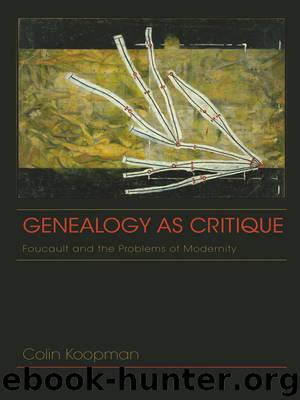Genealogy as Critique by Koopman Colin

Author:Koopman, Colin
Language: eng
Format: epub
Publisher: Indiana University Press
Published: 2013-03-14T16:00:00+00:00
The Reciprocal Incompatibility of Madness and Reason
The reception of Foucault’s History of Madness is a checkered affair. John Rajchman notes one troubling aspect of this reception: “[m]any had found in [Foucault’s] early work a kind of romanticism about madness.”25 Rajchman and others, including Clare O’Farrell, have attempted to correct this perception by revisiting the passages at the end of History of Madness in order to propose an alternative interpretation. In this revised view, these passages witness not a celebration of a repressed madness that artists like Nietzsche or Goya could liberate, but rather the idea that, as O’Farrell puts it, “[t]he work of art can only resemble or produce an effect of madness, it is not the language of madness itself.”26 It is not that Nietzsche is for Foucault a forgotten madman, but rather that Nietzsche is capable of reinvigorating a forgotten dialogue between madness and reason. Foucault laments not Nietzsche the excluded madman, but the fact that Nietzsche, like any other modern, can no longer be “at the limits of reason and unreason” since that border limit is precisely what modern purification rejects.27
For Foucault, madness is not banished or excluded by reason—rather, madness and reason are simultaneously produced as incapable of interaction. Foucault’s text does not witness reason’s subjugation of madness so much as a more insidious purification of reason from madness. Foucault had indeed spoken of madness at one point in terms of “inaccessible primitive purity,” but as Ian Hacking shows, this theme seems to have been later regarded as a mistake, or at least as a nonessential element for the central argument of the book.28 For the central argument is not that some primitive reality of madness is held down by a subjugating reason, but rather that madness and reason in their modern form are simultaneously produced as incoherent with one another. Foucault is in fact quite clear on this point: “In the Renaissance, madness was present everywhere and mingled with every experience by its images or its dangers. During the classical period, it was also on view, but on the other side of bars … In comparison to the incessant dialogue between reason and madness that had marked the Renaissance, classical confinement had been a silencing.”29 Foucault thus notes that his study of madness and rationality aims to “go back toward the decision that simultaneously links and separates reason and madness; it must aim to uncover the perpetual exchange, the obscure common root, the original confrontation that gives meaning to the unity, as well as to the opposition, of sense and non-sense.”30 The aim, in other words, is to restore that broken interaction where madness and reason could converse.
That broken interaction is what Foucault’s puzzling discussions of déraison (unreason) in the book are a reference to. Unreason is that lost space in which madness and reason would, or at least could, interact. One of the thresholds of modernity is the loss of that space. Hacking asserts that “The whole book is about the play back and forth between madness and unreason.
Download
This site does not store any files on its server. We only index and link to content provided by other sites. Please contact the content providers to delete copyright contents if any and email us, we'll remove relevant links or contents immediately.
Twilight of the Idols With the Antichrist and Ecce Homo by Friedrich Nietzsche(17719)
CHERUB: The Recruit by Robert Muchamore(1829)
CHERUB: The Fall by Robert Muchamore(1713)
CHERUB: Man vs Beast by Robert Muchamore(1612)
I Capture the Castle by Dodie Smith(1575)
The Edge of the Abyss (Sequel to The Abyss Surrounds Us)(1470)
Black Genesis by Robert Bauval(1319)
A Brief History of Everyone Who Ever Lived by Adam Rutherford(1250)
all by Unknown Author(1243)
Where Do I Start? by Chase Taylor Hackett(1062)
2016 Baby Names Almanac(979)
Painfully Rich by John Pearson(958)
Genetics by Adam Rutherford(922)
How to Argue With a Racist by Adam Rutherford(882)
2011 Baby Names Almanac(844)
Black Hawk Down by Mark Bowden(829)
It's All Relative by A. J. Jacobs(799)
My European Family by Karin Bojs(787)
Spook Street (Slough House) by Mick Herron(784)
